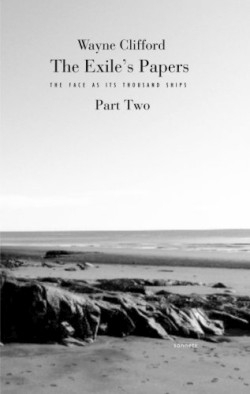The Exile's Paper, Part Two
The Face As Its Thousands Ships
Poetic form is always engaged in a delicate dance with expectation, as the poet seeks an adequate balance between rightness and surprise. Sticking too closely to time-worn steps will find the practiced reader asking, “If ‘breath’ is here, can ‘death’ be far behind?”
A version of this question lies at the heart of The Face As Its Thousand Ships, Part II of The Exile’s Papers, the projected four-volume sonnet series that has occupied Canadian poet Wayne Clifford for several decades. Written from the standpoint of late middle age—of “breath” shadowed by “death”—these poems explore freedom within the constraints of inevitability. Contrary to the expectations raised by an extensive treatment of a single genre by a poet in his 60s, Clifford’s book shows little concern for conventional “mastery”—though certain of its poems could easily claim this adjective. Instead, outrageous wordplay, variable rhyme and stanza patterns, and wild tonal shifts act out a continual metamorphosis, eluding the finality that the term “mastery” implies. The sonnet form seems primarily chosen to elicit this drama of temporizing.
The result is a book that can be tedious and exhausting, but which continually impresses with its multilayered wit. Openly indebted to the 17th-century metaphysical poets, Clifford’s work also recalls their 20th-century heir William Empson, both in linguistic density and in its undercurrent of warmth. A representative (though far from exhaustive) range of possibilities appears when one poem begins in a mock formal register (befitting its title, “Fate Will Realize the Three Sisters Whenever Possible”), then dips into broad doggerel, before concluding with a complex blend of deadpan and darker tonalities, when the poet’s mother responds over the phone to her son’s complaint about his mortality: “Pity. We began in me. You owe / the life you value now. I’ll hold. You cry.” If hardly a line in the book goes by without serious punning or troping, this shimmering surface depends on a somber background—a conceit expressed in the recurring image of a window blackened by night, prompting the poet’s resonant quip, “the dark’s / what founds reflection.”
These and similar moments—addressing such difficult subjects as the poet’s first love, his daughters’ departure from home, and his mother’s death—make The Face As Its Thousand Ships a striking, original collection, abounding in thought. Readers attuned to its distinctive music will not want to miss this series’ next installment.
Reviewed by
Paul Franz
Disclosure: This article is not an endorsement, but a review. The publisher of this book provided free copies of the book and paid a small fee to have their book reviewed by a professional reviewer. Foreword Reviews and Clarion Reviews make no guarantee that the publisher will receive a positive review. Foreword Magazine, Inc. is disclosing this in accordance with the Federal Trade Commission’s 16 CFR, Part 255.

